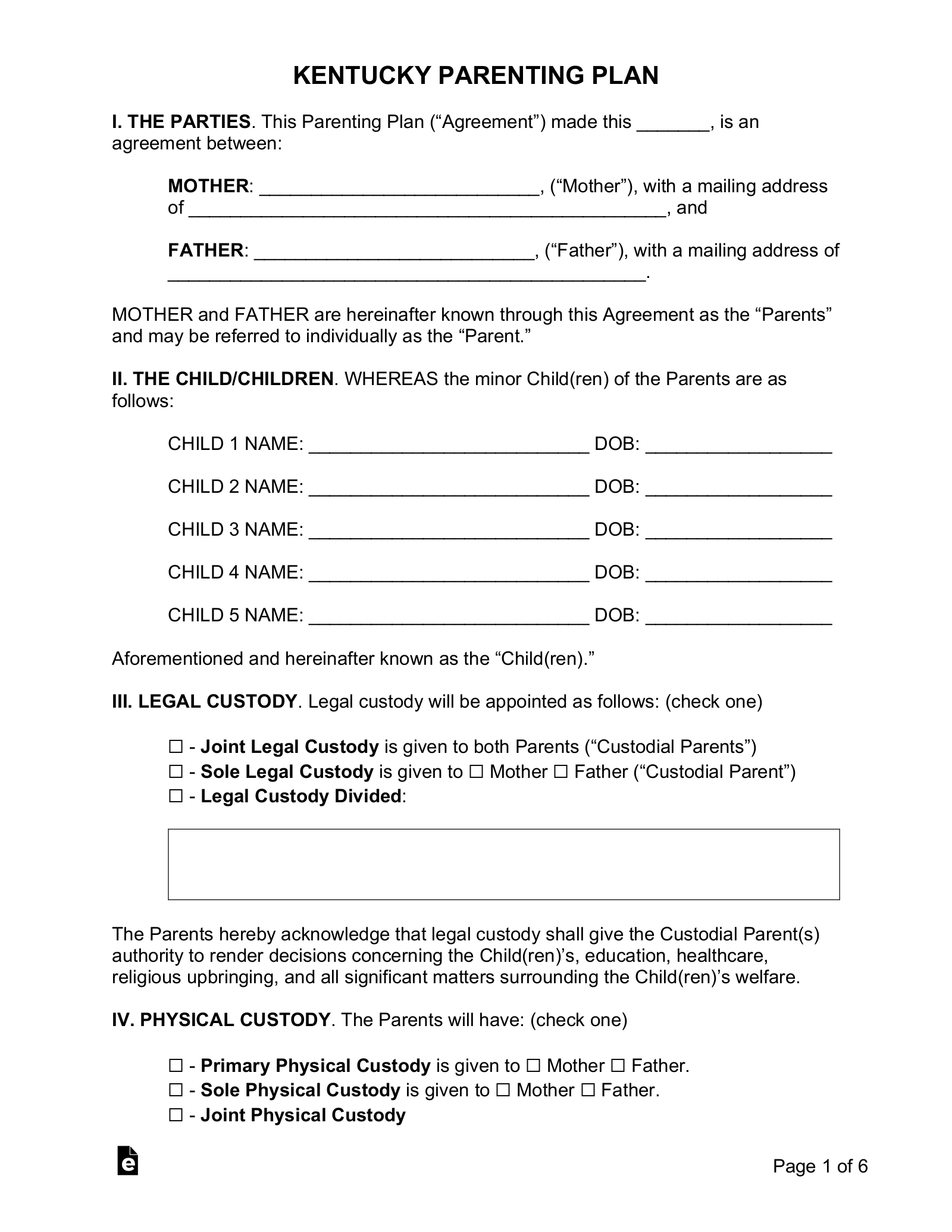Kentucky Custody Laws for Unmarried Parents in 2023
When it comes to custody laws in Kentucky, it’s essential to understand how they work, especially for unmarried parents. Custody determines where a child will live and who will make important decisions about their upbringing. In Kentucky, custody laws aim to serve the best interests of the child while also considering the rights of both parents.
Types of Custody in Kentucky

In Kentucky, there are two main types of custody: legal custody and physical custody. Here’s a quick overview:
- Legal Custody: This type gives a parent the right to make important decisions regarding the child’s life, including education, healthcare, and religious upbringing. Parents can share legal custody or one parent may have sole legal custody.
- Physical Custody: This refers to where the child lives. Physical custody can also be shared or sole. In shared physical custody, the child spends significant time with both parents. Sole physical custody means the child lives primarily with one parent.
Additionally, Kentucky recognizes joint custody, where both parents share responsibilities and decision-making. The court usually prefers arrangements that allow children to maintain strong relationships with both parents.
Factors Influencing Custody Decisions

When determining custody arrangements, Kentucky courts consider several factors to ensure that the child’s best interests are met. Some of the key factors include:
- Parental Responsibility: Courts look at each parent’s ability to provide a stable, loving environment.
- Child’s Wishes: Depending on their age and maturity, a child’s preferences may influence custody decisions.
- Co-parenting Ability: The court assesses how well parents can communicate and work together in the child’s best interest.
- Health of Parents: Physical and mental health of both parents can play a role in custody outcomes.
- Relationship with the Child: Courts consider the existing bond between the child and each parent.
Each case is unique, so these factors may weigh differently based on individual circumstances. Understanding these aspects can help parents prepare for custody discussions and negotiations.
Process for Filing for Custody
Filing for custody in Kentucky can seem overwhelming, but understanding the steps involved can make it easier. The process begins when one parent files a petition with the court. Here’s a simple breakdown of the steps you’ll need to follow:
- Step 1: Determine the correct court. Generally, you’ll file in the family court in the county where the child lives.
- Step 2: Complete the custody petition form. This form outlines your request for custody and the reasons behind it.
- Step 3: Serve the other parent. You must legally notify the other parent about the custody filing, usually by delivering court documents to them.
- Step 4: Attend the court hearing. Both parents will have a chance to present their case. The judge will consider all evidence and testimonies.
- Step 5: Receive the court’s decision. After reviewing everything, the judge will make a ruling on custody.
It’s important to prepare for the hearing thoroughly, as this will be your chance to show why your custody arrangement is in the child’s best interest. Consulting with a lawyer can also help ensure you understand your rights and responsibilities during the process.
Legal Rights of Unmarried Parents
Unmarried parents in Kentucky have specific legal rights regarding their children, which are crucial to understand. Whether you are the mother or the father, knowing your rights can help you navigate custody and support issues effectively:
- Custody Rights: Both parents have the right to seek custody, whether legal or physical, regardless of marital status.
- Child Support: Unmarried parents can seek child support through the court, ensuring financial responsibility for the child’s needs.
- Visitation Rights: If one parent has primary custody, the other has the right to request visitation. This helps maintain a relationship with the child.
- Decision-Making Rights: Both parents can participate in important decisions regarding the child’s upbringing, though legal custody may determine who has the final say.
It’s important to note that unmarried fathers may need to establish paternity legally to exercise these rights fully. This can involve signing an acknowledgment of paternity or going through the courts.
How to Modify Custody Agreements
Custody agreements can change as circumstances evolve, and Kentucky law allows for modifications when necessary. Here’s how to go about it:
- Step 1: Assess the need for modification. Significant changes in circumstances, such as a job relocation or a change in the child’s needs, can justify a modification.
- Step 2: Gather evidence. Document any changes that support your request for modification. This can include school records, medical documents, or changes in employment.
- Step 3: File a motion with the court. You’ll need to complete the appropriate forms and file them with the family court that issued the original custody order.
- Step 4: Serve the other parent. Just like the initial custody filing, the other parent must be notified of the proposed changes.
- Step 5: Attend the hearing. Be prepared to present your case, focusing on why the modification is in the child’s best interest.
Remember, courts prioritize the child’s welfare above all else. If you can demonstrate that the change will benefit the child, you have a stronger chance of having your modification approved.
Enforcement of Custody Orders
Enforcing custody orders in Kentucky is crucial for ensuring that both parents adhere to the agreed-upon arrangements for their child’s welfare. Sometimes, one parent may not comply with the custody order, which can create confusion and distress. Here’s how you can enforce custody orders effectively:
- Know Your Rights: Familiarize yourself with the custody order and understand the specific terms. This includes visitation schedules and responsibilities.
- Document Violations: Keep a detailed record of any violations, such as missed visitations or refusals to communicate. This evidence is essential if you need to take legal action.
- Communicate: Try to resolve issues directly with the other parent first. Open communication can sometimes clarify misunderstandings and lead to an amicable solution.
- File a Motion: If violations continue, you can file a motion for contempt in court. This legal action asks the court to enforce the custody order and address the noncompliance.
- Seek Legal Assistance: Consulting a lawyer can help you navigate the enforcement process effectively. They can guide you on the best course of action and represent you in court if necessary.
Remember, the court’s primary concern is the child’s well-being. Therefore, it’s essential to act in a manner that prioritizes the child’s best interests during any enforcement process.
Resources for Unmarried Parents in Kentucky
Unmarried parents in Kentucky can access various resources to help navigate the complexities of custody and child support. Knowing where to find assistance can make a significant difference. Here are some valuable resources:
- Kentucky Court System: Visit the official website for information on custody laws and procedures.
- Family Court Services: Family courts provide mediation services to help parents resolve disputes amicably.
- Legal Aid of Kentucky: This organization offers free or low-cost legal assistance to low-income families facing custody issues.
- Child Support Enforcement Program: This program helps establish and enforce child support orders for unmarried parents.
- Parenting Classes: Various organizations offer parenting classes that can improve co-parenting skills and enhance child-rearing practices.
Connecting with these resources can empower unmarried parents to make informed decisions regarding custody and support, ensuring the best outcomes for their children.
Frequently Asked Questions
When it comes to custody laws for unmarried parents in Kentucky, there are often many questions. Here are some frequently asked questions that can help clarify common concerns:
- What is the difference between legal and physical custody? Legal custody involves the right to make decisions about a child’s upbringing, while physical custody determines where the child lives.
- Can an unmarried father gain custody? Yes, unmarried fathers can seek custody. Establishing paternity may be necessary to assert legal rights.
- How can I change a custody agreement? You can request a modification by filing a motion with the court and providing evidence of changed circumstances.
- What should I do if the other parent violates the custody order? Document the violations and attempt to resolve the issue directly. If necessary, you can file a motion for contempt in court.
- Where can I find legal help? Resources like Legal Aid of Kentucky and local family law attorneys can provide guidance and representation.
These FAQs can help you navigate your rights and responsibilities as an unmarried parent, ensuring you have the support and information you need.
Conclusion
Navigating custody laws as an unmarried parent in Kentucky can be complex, but understanding your rights and the legal framework can empower you to make informed decisions for your child’s welfare. Remember that the focus of any custody arrangement is the best interest of the child. Whether you are filing for custody, modifying existing agreements, or ensuring compliance with court orders, there are resources and legal support available to help you through the process. Open communication with the other parent and a commitment to cooperation can lead to healthier outcomes for your child. With the right knowledge and support, you can successfully navigate the challenges of custody as an unmarried parent in Kentucky.


